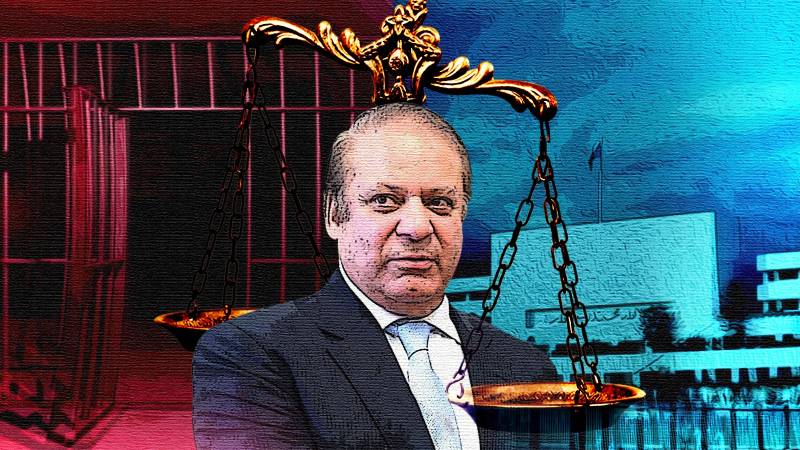
As the Pakistan Muslim League-Nawaz (PML-N) leadership confirms Nawaz Sharif's impending return to Pakistan before the forthcoming general elections, many are discussing the legal challenges he is likely to face once he does land in the country.
Political pundits believe that Sharif's return to Pakistan, possibly by mid-September this year, is important for two reasons: First, his return would check the military's role during the election season. Second, he would instil a new life within the PML-N and take control of the narrative on the country's economy.
However, before his return, Nawaz Sharif must overcome legal challenges he faces – including the convictions in Avenfield and Al-Azizia references and the lifetime disqualification by the Supreme Court.
The National Accountability Bureau (NAB) had previously filed three corruption cases against the Sharif family in 2017 – The Avenfield Properties case, the Flagship Investment case, and the Al-Azizia steel mills case. This was in addition to the Supreme Court's 2017 decision that disqualified him in the Panama Papers case.
Legally, Nawaz Sharif is currently considered an absconder after being sentenced to rigorous imprisonment for a term of seven years along with a fine of Rs1.2 billion and $25 million in the Al-Azizia reference.
Also, the Supreme Court had disqualified Nawaz Sharif for his lifetime from holding public office.
The Islamabad High Court (IHC), while deciding the appeals of Sharif's daughter, Maryam Nawaz, and his son-in-law Captain (retired) Muhammad Safdar, in corruption references had held that Sharif would have to file applications for the restoration of the appeals.
In 2021, the IHC accepted the plea of amicus curiae Azam Nazir Tarar regarding the appeals of Nawaz Sharif and dismissed the appeal for non-prosecution. NAB subsequently contended that the appeals against Sharif's conviction should be decided on merits.
Legal experts close to the PML-N believe that the decision of the IHC grants relief to Nawaz Sharif, and it allows him to apply for the restoration of the appeals against his conviction. Further, they argue Sharif's acquittal in the Avenfield and Al-Azizia references will be a matter of three to four hearings at most.
However, Sharif still faces an arrest upon his return to the country as he was granted bail for only eight weeks on medical grounds by the IHC in 2020.
Senior lawyer and constitutional expert Hafiz Ahsan Khokhar told The Friday Times that the former prime minister was also barred from running for office in accordance with the two court rulings, one by the Supreme Court and the other by the accountability court, in light of constitutional provisions included in articles 62(F) and (H) of the Constitution.
"Following the Panama ruling, the Supreme Court ruled in another case that the incapacity caused by failing to meet the requirements under Article 62 (1)(f) of the Constitution imposes a permanent bar that remains in effect for as long as the declaratory judgment supporting the conclusion of one of the delinquent kinds of conduct under Article 62 (1)(f) of the constitution remains in effect," said Khokhar.
However, he added, it was not the role of the courts to declare that disqualification under Article 62(1)(f) of the Constitution was permanent or had a set time limit for it. The ideal course of action for Nawaz Sharif would be to let the parliament decide this issue, but that choice has not yet been made.
According to him, in an earlier judgment before the Panama case, the Supreme Court held that though there was no clear determination about the length of the disqualification in article 62 (1)(f). Despite that, it held that under Article 63, there were certain disqualifications which were of temporary nature and a person so disqualified could become qualified after the lapse of a certain period.
"The current change to section 232 of the Election Act of 2017 by the outgoing government addressing the determination of disqualification for a period of five years, which is not fixed in the Constitution, and the disqualification of a criminal will not exceed five years," said Khokhar.
The new amendment to the Election Act, however, will not be of any benefit to the deposed prime minister for two reasons: first, it won't apply retroactively, and second, it can't overturn the Supreme Court's judgment regarding the disqualification period until the Supreme Court reverses it.
In accordance with a previous ruling by the Supreme Court, the Constitution imposes a permanent bar that remains in force as long as the declaratory judgment supporting the determination that the behaviour in question violated article 62 (1)(f) of the Constitution is still in play.
According to another legal expert, the former prime minister was declared a fugitive and must now present himself before the appropriate court for further proceedings over his pending appeals.
However, the opinion of lawyers is divided on the retrospective impact of the new legislation – which limits disqualification under Article 62 (1)(f) to five years.
A section of lawyers believe that the new legislation has not been interpreted by the superior courts – and that Nawaz Sharif's disqualification shall stand concluded after five years if the legislation is not struck down by the court.
Should Nawaz Sharif dream of returning to the office of Prime Minister for a fourth time or simply desire to contest elections for a return to the lower or upper house of parliament, there remain a host of legal complications in his path, most of which will unfold only after he steps on to Pakistani soil.

